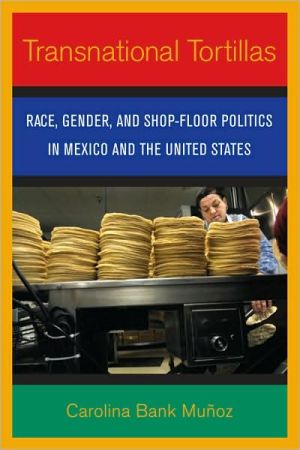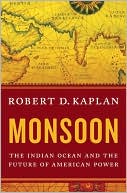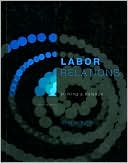Transnational Tortillas: Race, Gender, and Shop-Floor Politics in Mexico and the United States
This book looks at the flip side of globalization: How does a company from the Global South behave differently when it also produces in the Global North? A Mexican tortilla company, "Tortimundo," has two production facilities within a hundred miles of each other, but on different sides of the U.S.-Mexico border. The workers at the two factories produce the same product with the same technology, but have significantly different work realities. This "global factory" gives Carolina Bank Muñoz an...
Search in google:
This book looks at the flip side of globalization: How does a company from the Global South behave differently when it also produces in the Global North? A Mexican tortilla company, "Tortimundo," has two production facilities within a hundred miles of each other, but on different sides of the U.S.-Mexico border. The workers at the two factories produce the same product with the same technology, but have significantly different work realities. This "global factory" gives Carolina Bank Muñoz an ideal opportunity to reveal how management regimes and company policy on each side of the border apply different strategies to exploit their respective workforces' vulnerabilities.The author's in-depth ethnographic fieldwork shows that the U.S. factory is characterized by an "immigration regime" and the Mexican factory by a "gender regime." In the California factory, managers use state policy and laws related to immigration status to pit documented and undocumented workers against each other. Undocumented workers are subject to harsher punishment, night-shift work, and lower pay. In the Baja California factory, managers sexually harass women—who make up most of the workforce—and create divisions between light- and dark-skinned women, forcing them to compete for managerial attention, which they understand equates with job security. In describing and analyzing the differences in working conditions between the two plants, Bank Muñoz provides important new insights into how, in a globalized economy, managerial strategies for labor control are determined by the interaction of state policies and labor market conditions with race, gender, and class at the point ofproduction.
1 The Tortilla Behemoth and Global Production 12 The Political Economy of Corn and Tortillas 243 A Tale of Two Countries: Immigration Policy and Globalization in the United States and Mexico 384 Hacienda CA: Immigration Regime 645 Hacienda BC: Gender Regime 966 Fighting Back? Resistance in the Age of Neoliberalism 1307 Shop-Floor Politics in the Twenty-First Century 162Notes 177References 183Index 195
\ From the Publisher"Carolina Bank Muñoz's rich ethnographic fieldwork in two tortilla factories, one in Mexico and the other in the United States, has produced an extremely well crafted, highly accessible book on the role of state policy, race, gender, and immigration status in the labor process and, more precisely, labor control. The author of this must-read book for labor and immigration scholars and activists, provides a well-researched and convincingly argued analysis of how managers employ an 'immigration regime' on one side of the border and a 'gender regime' on the other to discipline labor. The importance of this book lies both in the theoretical contributions that it makes to several literatures and the practical insights that it offers to organizers of low-wage and immigrant workers."-Héctor L. Delgado, University of La Verne, author of New Immigrants, Old Unions: Organizing Undocumented Workers in Los Angeles\ "Transnational Tortillas presents a fascinating analysis of the ways in which state policies, immigration status, gender, and race shape labor control at the factory level. Carolina Bank Muñoz's study of the United States is particularly insightful and persuasively shows how immigration status has allowed employers to deploy methods of labor control that pit documented and undocumented workers against each other and that take advantage of undocumented workers' lack of citizenship status and fear of deportation to enact labor control on the shop floor."-Teri L. Caraway, University of Minnesota, Twin Cities, author of Assembling Women\ "Carolina Bank Muñoz gives us a fascinating account of how management from one company with two plants on either side of the border tailors its labor control strategies according to the immigration status, race, and gender characteristics of the workforce, while drawing on opportunities made available through national laws and policies. Bank Muñoz's acute observations of shop floor dynamics and her ability to elicit telling commentary from factory workers and managers alike have produced a fresh portrait of labor exploitation and resistance in today's global economy."-Maria Lorena Cook, Cornell University\ "Transnational Tortillas is a fascinating in-depth look at the production regimes of two tortilla plants owned by the same Mexican corporation and both employing Mexicans, one on each side of the border. Carolina Bank Muñoz emphasizes on the one hand the effects of globalization, neoliberalism, and changing U.S. immigration policy, and on the other hand the construction of race and gender. She deftly uses these analytical elements to explain the different power relations in the two settings, as well as changes over time in those relations. This book is required reading for those interested in work, immigration and gender in an increasingly globalized economy."-Chris Tilly, University of Massachusetts Lowell\ \ \








